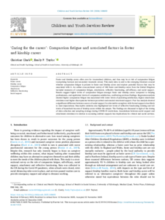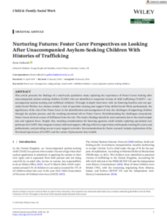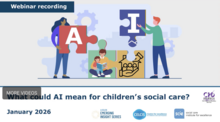

Displaying 1 - 10 of 1653
This article reports on Swedish adults who were adopted from Colombia decades ago and are now searching for their birth mothers after discovering that many international adoptions — involving around 60,000 children including nearly 5,700 from Colombia — were marred by irregularities such as false documentation, coerced consent, and children declared orphans when they were not, leaving adoptees without accurate identity information and grappling with psychological impacts of lost heritage.
For at least the last decade, Artificial Intelligence (AI) has increasingly been seen as a possible answer to how to make public services more efficient.
This study examines the presence of compassion fatigue among foster and kinship carers in the United Kingdom and explores factors associated with it using survey data from 180 caregivers. Findings indicate that carers experience higher levels of compassion fatigue than helping professionals, with greater fatigue linked to lower parenting satisfaction, attachment avoidance, and unmet expectations of social support, highlighting important implications for social and clinical support systems.
This article explores the experiences of foster carers supporting unaccompanied asylum-seeking and trafficked children (UASTC) in the U.K., highlighting challenges such as limited specialist training, the emotional toll of managing risk, and navigating the asylum process. Despite the small sample, findings suggest the need for trauma-informed care pathways, tailored training and supervision, peer support networks, and further research into UASTC experiences across different placements.
The blog describes a visit to a Swedish Family Centre, where health, education, and social support services for families with young children are co-located under one roof to provide early, preventative, and relationship-based support.
The article reports that a new batch of case reports from child protection court proceedings in Ireland reveals “significant and serious systemic issues” in the country’s care system, according to the Children’s Rights Alliance, which welcomed the
The Irish Times reports that vulnerable children in Ireland’s care system are spending up to three years in “unregulated” emergency accommodation because of severe shortages in suitable, regulated placements.
The UK Parliament’s Public Accounts Committee has found that hundreds of vulnerable children in England’s care were placed for months in “illegal” homes, settings not registered with the national regulator Ofsted, due to severe shortages
To launch a new Emerging Insight Series of webinars from CELCIS, this session set the scene by considering what AI might mean for children’s social care. It explored fundamental questions, potential opportunities, and challenges related to how AI is being used in practice; its role in responding to the care and protection needs of children and young people and supporting their families; and emerging understanding of the influences and impacts of AI on children’s and young people’s lives.
Whether we always know it or not, Artificial Intelligence (AI) is a now an element of many of the digital and electronic tools many of us use every day in our professional and personal lives.



